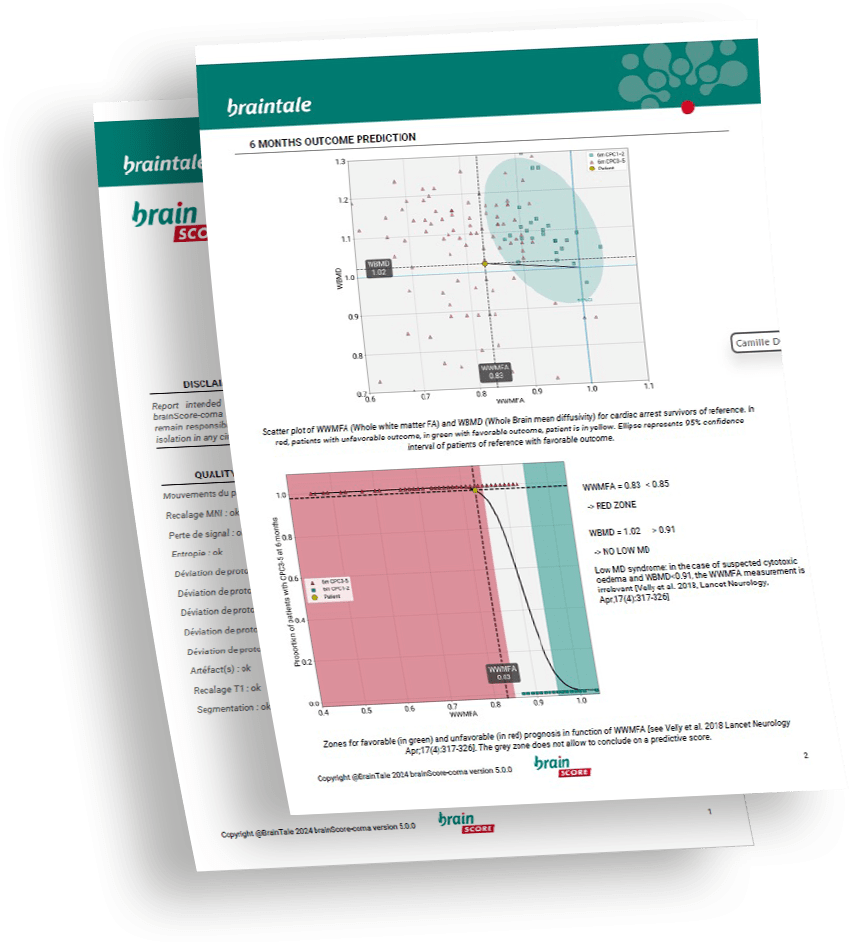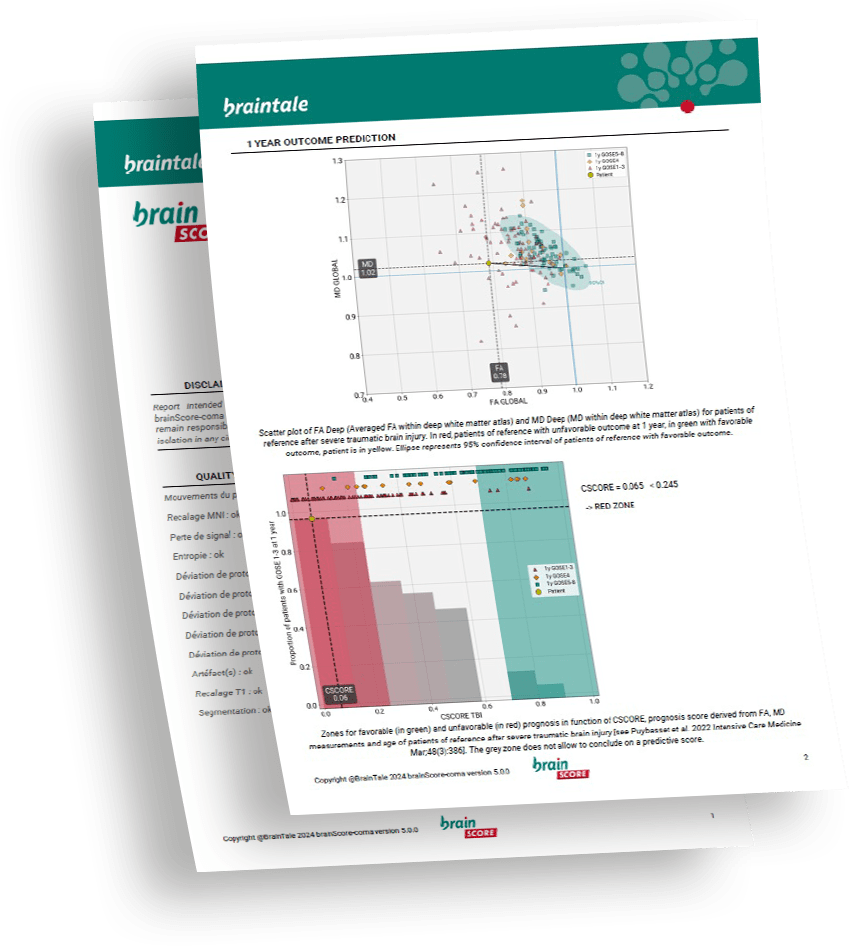BrainScore-coma

BrainScore-coma provides the physician with a neurological prediction score for comatose patients’ outcomes following cardiac arrest or traumatic brain injuries. The score is used by physicians to assist in diagnosis and support patients, caregivers, and families in making informed decisions.
Key features of our product brainScore-coma
- Non-invasive and painless
- High clinical value: 100% specificity and 72% sensitivity of unfavorable outcome for cardiac arrest patients, 95% specificity and 54% sensitivity of unfavorable outcome for traumatic brain injury patients
- Scientifically validated: 3 publications in peered-reviewed journals including The Lancet Neurology
- Clinically validated for 2 years
- Based on cohorts of 212 patients for traumatic brain injury and 128 patients for cardiac arrest
How does it work?
brainScore-coma is a module accessible through our platform brainTale-care, a secured web platform used in SaaS mode (Software as a Service). No software installation on the center’s hardware is required to use brainScore-coma.


General description
brainScore-coma is a module of brainTale-care medical device for the provision of a neurologic prediction score related to comatose patient outcome based on diffusion regional standardized parameters from brain diffusion Magnetic resonance images provided by brainQuant.
The results can be viewed and/or downloaded from brainTale-care interface in the form of graphics, images, videos and reports in pdf format.
MRI should be performed between day 7 and day 28 after cardiac arrest and between day 7 and day 35 after head trauma. The DTI sequence must be available in all cases; in case of cardiac arrest indication, the 3DT1 is mandatory as well.
For cardiac arrest patients the score predicts the patient’s outcome at 6 months.
For head trauma patients the score predicts the patient’s outcome at 1 year.
brainScore-coma is intended to be used for Comatose patients admitted to an intensive care unit after cardiac arrest or head trauma, meeting the following inclusion criteria:
- Age ≥ 18 years (adult population, regardless of gender),
- For cardiac arrest patients: between 18 and 80 years of age (limits included),
- For head trauma patients: between 18 and 70 years of age (limits included),
- Persistence of unconsciousness on day 7 after cardiac arrest or severe head trauma.
Publications
- Velly et al., Use of brain diffusion tensor imaging for the prediction of long-term neurological outcomes in patients after cardiac arrest: a multicentre, international, prospective, observational, cohort study, The Lancet Neurology, 2018 Apr;17(4):317-32
- Puybasset et al., Prognostic value of global deep white
matter DTI metrics for 1-year outcome prediction in ICU traumatic brain injury patients: an MRI-COMA and CENTER-TBI combined study. Intensive Care Med, 2021 Dec; 48:p 201–212 - Simeone et al., Long-term follow-up of neurodegenerative phenomenon in severe traumatic brain injury using MRI. Ann Phys Rehabil Med. 2022 Nov;65(6):101599.
Clinical warnings
brainScore-coma is informing clinical management as part of a multimodal evaluation process, including several sources or technologies (clinical information, biological or electrophysiological parameters, imaging data including MRI/CT/PET) and is not triggering an immediate or near-term action by itself. It is not used to guide next diagnostics or next treatment interventions. The physician and the multidisciplinary team bear the sole responsibility for the patient management based on various information including prognostics tools.
The use of brainScore-coma can by no means replace a diagnosis by a licensed and competent physician nor constitute medical advice or diagnosis which can only be obtained from a physician. The physician bears the sole responsibility for the diagnosis. The calculated parameters cannot be used without the medical advice of a licensed and competent physician.
brainScore can lead to no outcome parameters due to the poor quality of MR images.
Performance characteristics
The brainScore-coma module has the following analytical performance:
- Coefficient of variation in test-retest repeatability of the prognosis outcome parameters inferior to 10%.
- Coefficient of variation in reproducibility across MRI scanners the prognosis outcome parameters inferior to 15%.
The prognostic performance in external validation is as follows:
- For cardiac arrest patient (WWMFA, prediction of 6-months Best CPC from 1 to 2 with 95% Confidence interval):
- Specificity = 100 % (100% -100%)
- Sensitivity = 38% (29% – 47%)
- For cardiac arrest patient (WWMFA, prediction of 6-months Best CPC from 3 to 5 with 95% Confidence interval):
- Specificity = 100 % (100% -100%)
- Sensitivity = 72% (63% – 81%)
- For TBI patients (CScore, prediction of 1-year GOSE from 1 to 3):
- Specificity = 95% (92% – 98%)
- Sensitivity = 54% (46% – 62%)
- For TBI patients (CScore, prediction of 1-year GOSE from 4 to 8):
- Specificity = 96% (93% – 99%)
- Sensitivity = 46% (38% – 54%)
Legal disclaimers
- BRAINTALE, whose head office is 11 rue de l’Académie 67000 – STRASBOURG, is registered with the Trade and Companies Register under number 840 995 138 RCS STRASBOURG
- Manufacturer address: 140 rue du Chevaleret, 75013 Paris
- BrainTale-care is a Class IIa medical device
- Notified body : BSI Netherlands 2797
- This information deals with brainTale-care platform and modules (brainQuant and brainScore-coma). We invite you to read carefully the instructions for use and the label.
- BrainTale-care is not reimbursed by social security.
- BrainTale is ISO 13485 certified company

Last update: 09/07/2024

